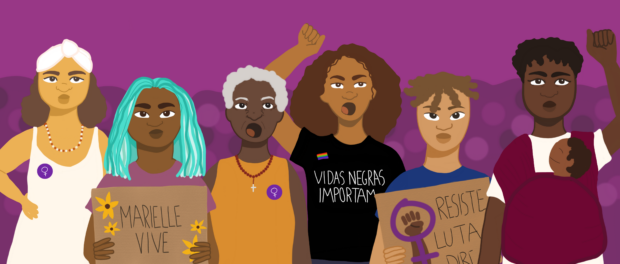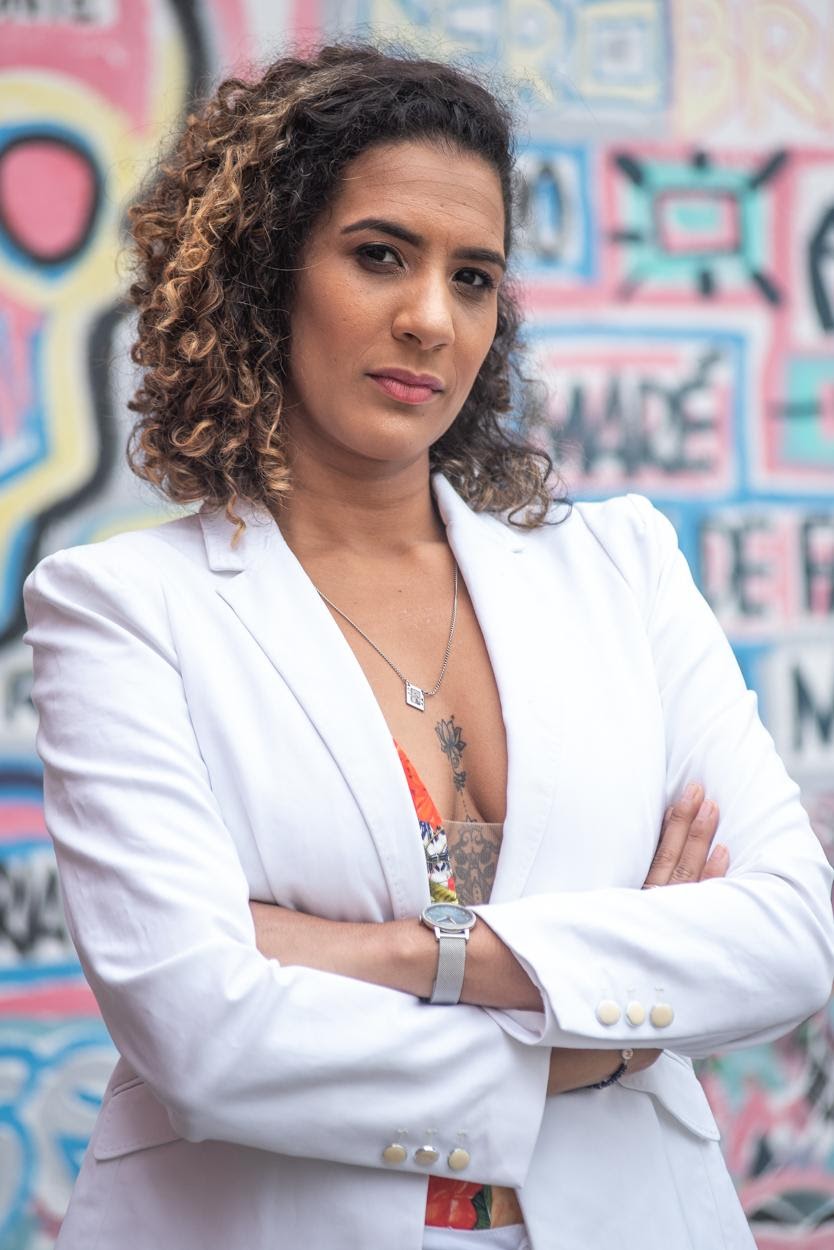
Published in Portuguese on March 8, International Women’s Day, and in English today, March 14, the third anniversary of the assassination of iconic activist and City Councillor Marielle Franco, this article written by Marielle’s sister Anielle is the latest contribution to our year-long reporting project, “Rooting Anti-Racism in the Favelas: Deconstructing Social Narratives About Racism in Rio de Janeiro.” Follow our Rooting Anti-Racism in the Favelas series here.
This International Women’s Day, it is important to recognize that we have come a long way! In a year fraught with challenges to the Brazilian population—a record number of Covid-19 deaths; escalating social inequality, domestic violence, and police operations in favelas; and the staggering negligence and death project fueled by the federal government—it was women who led the way in processes of resistance and in creating alternative modes of living across Brazilian cities, favelas and peripheries.
It was Lélia Gonzalez, a black intellectual and activist—and a reference for many of us—who pointed out the importance of championing an Afro-Latin American feminism: a fight committed to the liberation of our people and to rupturing systems of oppression tied to the structures under which we live, such as race, class, and the patriarchy.
“The activities of black women in decision-making spheres bring us the possibility of imagining new milestones for the building of society.”

I tend to think that “freedom” can have many meanings in today’s world. But for the black population, this is its all-too-familiar definition: aiming to access the world from a position of equality and equity. This has been a struggle for centuries in our country. And, for us, black women, it is something we build with struggle, sweat and collective effort. I see that, in recent years, I have gained a better grasp of the importance of looking back to understand the paths we can choose to follow today in seeking a significant structural change in our country.
I want to begin by saying that one of the great pillars that supported my fight and my sister’s, Marielle Franco, is our family. A black family from the favela, having strong matriarchal features—a stronghold of powerful women. Mari and I were born from this space, and its legacy is the growing number of black women at the forefront of social change in this country. These bodies and their experiences, their creations and struggles inspired by Mari, disrupt everyday structures that try to make life impossible for the black population.
Marielle was lost forever three years ago, but the legacy she left has a profound impact on the creation of other perspectives for a future and for society; one where we, black women, play a crucial role in bringing on change and in creating a more just and egalitarian world. This legacy of Mari’s is black feminism. A kind of feminism that underlines that the oppressions of race, class and gender are connected, and that we, black women, will only be free when the chains of racism, patriarchy and class have been destroyed. Marielle carried this symbol within her, and her role was to fight for black women, theorizing and creating other practices based on collective construction and ancestry. She was an amazing woman, and her legacy is a product of these principles, contributing to black feminism on a global level.
And it is this feminism that gives us clues about what “new normal” we will demand after the pandemic: about the bodies we want to see in power to bring on change. The fight against the impacts of Covid-19 in our country is being spearheaded on the frontlines by black women. Equipped with knowledge and expertise, the political experience of black women must be recognized and valued. Having these bodies participate in decision-making spaces is a way to break with their structural obliteration and, also, to recognize that the making of truly effective solutions that work for all of society depends on us.
The Marielle Franco Institute, an organization created by our family to spread Marielle’s legacy, to defend her memory, to fight for justice and to sow her seeds, has released a report with the Black Women Decide movement, entitled Para Onde Vamos (Where We Are Going). The report states that the work of black women can contribute to shattering the illusion that insists on casting us merely in society’s supporting roles, shifting the structures of this racist system, and solidifying our role as protagonists, at the forefront of the fight against fascism, racism, and patriarchy. The activities of black women in decision-making spheres bring us the possibility of imagining new milestones for the building of society.
The sense of organization and of leadership in Mari and in all black women who today lead the way to bring on change is a portrait of a recent past—rich with families of strong women who have faced many adversities. This past is a painful one, one in which we learned from the footsteps of our elders the strategies we must employ to reposition and value our role as important agents of change.
“Having these bodies participate in decision-making spaces is a way to break with their structural obliteration and, also, to recognize that the making of truly effective solutions that work for all of society depends on us.”
On this International Women’s Day, may we make it crystal clear that our fight, our life, and our words matter. Together, collectively, we shall never be disrupted.

About the author: Born and raised in the favelas of Maré, Anielle Franco holds a master’s in Journalism and English from Florida A&M University and is currently studying for a Master’s in Ethno-Racial Relations at CEFET-RJ, where she is focusing on the identity of black women through the memory and legacy of Marielle Franco, her sister, and daily inspiration. She recently published her first book, ‘Letters to Marielle,’ and has contributed to other volumes, including Angela Davis’s autobiography. She currently works as a teacher, lecturer, and writer, as well as being director of the Marielle Franco Institute, curator of Projeto Papo Franco and of the course Marielles. Anielle is a guest columnist for Marie Claire and Mídia Ninja.
About the artist: Raquel Batista is a visual artist and works as a photographer and illustrator. A black woman, resident of Rio’s West Zone, she is an undergraduate at UFRJ’s School of Fine Arts.
This article is the latest contribution to our year-long reporting project, “Rooting Anti-Racism in the Favelas: Deconstructing Social Narratives About Racism in Rio de Janeiro.” Follow our Rooting Anti-Racism in the Favelas series here.
